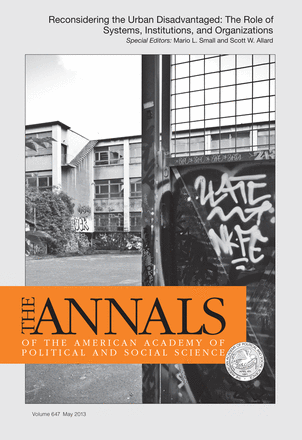Over the last 25 years, social science on urban poverty has grappled primarily with evidence of deindustrialization and the loss of low-skilled manufacturing jobs. In turn, structural economic change has transformed family structure, educational attainment, crime, and geographic concentration of the poor. Researchers have approached these issues from a limited set of theoretical perspectives, perspectives wherein the core units of analysis, aside from the market, have been the individual and the neighborhood. The editors of this volume argue that, today, understanding the conditions of these highly disadvantaged populations requires a focus on not only individuals and their neighborhoods but also, and perhaps more importantly, on the organizations that structure their lives, the systems in which those organizations are embedded, and the institutions that regulate both.

